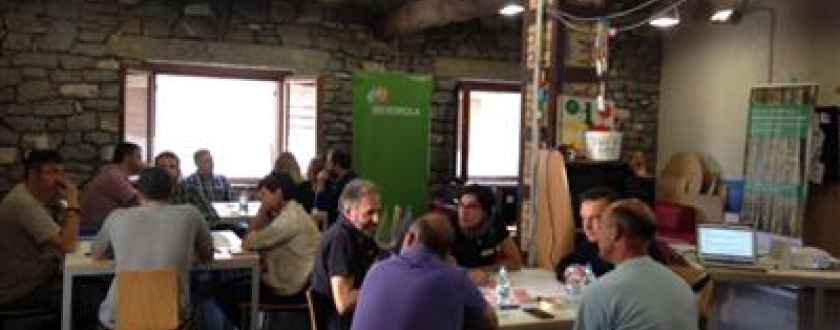Improving the Resilience of Social-Ecological Systems in Mountain Regions as a Climate Change Adaptation Tool
Description of the case study
Mountain regions are among the world’s most climate-sensitive areas. This proposal is created with the aim of analysing the implications of climate change on mountain systems with a social, territorial, and participatory focus, and producing action plans to improve territorial resilience based on ecosystems as a climate change adaptation tool, identifying a collection of simple, realistic, and manageable actions.
The project has been executed in two pilot regions: The Ordesa Viñamala Biosphere Reserves (Huesca) and the Valles de Omaña y Luna Biosphere Reserve (Castile & Leon).
» First phase: introducing the climate change problem to the local population, identifying essential ecosystems and related economic activities.
» Second phase: a participatory process to analyse the socio-ecosystem and define a common vision for the future; identifying existing barriers and potential drivers to produce positive transformation, adapting ourselves to unexpected impacts.
» Third phase: identifying specific, simple, and manageable actions through the participatory process; exchanging experiences and inspiration between these territories and other mountain areas, Biosphere Reserves, and other interested institutions; improving the actions presented and pilot action plan with assigned resources and calendar that can be potentially extrapolated to other areas.
Overall aim: improving Mountain Biosphere Reserves’ ability to adapt to climate change through an Adaptation focus based on Ecosystems.
Specific objectives:
» Analysing and diagnosing the climate change implications for the two selected mountain regions.
» Raising local population awareness on the vulnerability of these regions and the need for adaptation in specific sectors and ecosystems.
» Defining a common vision of the future from their own vulnerability and potential.
» Identifying realistic, simple, and manageable actions to strengthen the territory’s adaptation to climate change.
» Exchanging experiences and inspiration with other mountain territories.
» Producing an Action Plan for each of these territories.
» Identifying productive systems and ecosystems that are particularly vulnerable to climate change, and identifying risks. An awareness-raising talk given by a key expert in each of the territories.
» Carrying out a participatory multi-sector process in each of the two participating Biosphere Reserves to analyse problems and potential, and identifying simple, realistic, and manageable actions.
» Carrying out an “Experience Exchange, Conceptualisation, and Collaboration Meeting” with the aim of enriching identified actions throughout the participatory process in both Biosphere Reserves with participant contributions, favouring cross-inspiration.
» Producing a pilot Action Plan for the Ordesa-Viñamala and Valles de Omaña y Luna Biosphere Reserves with 11 and 15 identified actions, respectively.
Case study developed and implemented as a climate change adaptation measure.
Territorios Vivos Association (driving entity), Ordesa-Viñamala Biosphere Reserve, Valles de Omaña y Luna Biosphere Reserve, the Biodiversity Foundation, and the Iberdrola Foundation (financing entities)
Additional Information
Participants in all stages: civil sector organisations, managers of protected natural spaces, public organisations, private entities, regional administrations, local administrations, sector associations, universities and research centres, service and industrial sector professionals, technicians and managers of projects associated with the theme (conservation, local development, mountain, and climate change).
The participatory process was inspired by two methodologies related to the transition towards sustainability and resilience: The Natural Step (https://thenaturalstep.org) and Wayfinder (https://www.stockholmresilience.org/research/research-news/2018-09-12-in...)
*Success factors:
» Introducing a complex concept such as climate change to the territorial reality
» Innovating, focused on ecosystem-based adaptation
» Opting for local participation despite its difficulties
» Properly designing the participatory process with particular attention to facilitation
» Seeking tangible, concrete, and low-budget solutions
» Focusing on energy mobilisation in the right direction more than solutions to complex problems
» Seeking out active collaboration and experience exchange
» Communication
*Limiting factors:
» Limited Biosphere Reserve budget and dependence on external funds that make implementing the various actions identified difficult
» Later action implementation facilitation (frustration management)
Project funding amounts to €58,556, of which 66% is from the Biodiversity Foundation, and the remaining from the project’s partners.
This proposal falls within the Ordesa-Viñamala Action Plan for Spanish Biosphere Reserves, leading the way for various objectives set therein.
On the other hand, it is aligned with the National Climate Change Adaptation Plan in terms of Mountain Areas, and is consistent with the Aragon Climate Change and Clean Energy Strategy’s targets, particularly in terms of restoring ecosystems, and the Castile & Leon Regional Climate Change Strategy in terms of its adaptation target.
03/01/2019 - 6/30/2019 (3 months - completed)
Reference information
PYRENEAN CLIMATE CHANGE OBSERVATORY
Avenida Nuestra Señora de la Victoria, 8
22.700 - Jaca
Huesca - España
+34 974 36 31 00
info_opcc@ctp.org







